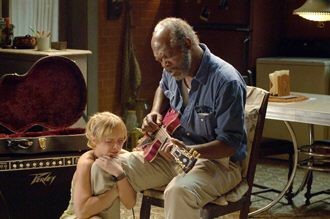| “Maybe if I squeeze his leg hard enough, he’ll stop playing ‘The Song That Never Ends,’” Christina Ricci wonders. Courtesy photo. |
| Black Snake Moan Writ. & dir. Craig Brewer; feat. Samuel L. Jackson, Christina Ricci, Justin Timberlake, John Cothran Jr. (R) |
Meanwhile, Lazarus (Jackson) attempts to adjust to a single life after his wife of 12 years walks out on him. When Laz, a farmer and former blues man, finds Rae, battered and unconscious, lying in the road, he takes her home, intending to nurse her back to health. When she becomes restless and lascivious, Laz puts her in chains and explains: “God seen fit to put you in my path, and I aim to cure you of your wickedness.”
What follows is a fierce psychological duel between two headstrong but heartbroken people. Lazarus, whose name hints a bit too broadly at his personal redemption, seethes with murderous rage over his wife’s desertion. “Sometime,” says Son House, in a brief clip inserted toward the end of the film, “that kind of blues make you kill somebody.” Though he comes close to killing somebody, Laz turns instead to the musical blues for solace and sublimation. He strums and sings his way back to mental balance. Writer-director Craig Brewer (Hustle & Flow) uses potent blues within both the story and the soundtrack to create a blowzy parable about splintered spirits.
As Rae, the town slut, Ricci wallows in debasement (if you can’t find art on the store’s ground floor, look in debasement). One of the many men who gets inside Rae’s accommodating pants bluntly observes: “You’d fuck a tree if it was handy.” Rae, a drug-addled Jezebel who is forever wriggling out of skimpy threads, is much too handy a stereotype. Writhing, wimpering, and mewling, she gives promiscuity a bad name. The script’s explanation for her grotesque behavior — sexual abuse during childhood — is entirely too neat a method to sum up the mess that is Rae. Her true love, Ronnie, also has a flaw, but the severe anxiety attacks from which he suffers seem a function more of cinematic symmetry than genuine infirmity.
Rae’s propensity for interracial copulation — moaning for black snakes — adds another tingle to this Gothic tale of the rural South. Laz dares not summon the police to deal with Rae, because he is well aware that a black man who houses a young white woman is presumed guilty of rape. The fact that he keeps Rae in chains is a titillating inversion of African-American history.
Black Snake Moan, which derives its title from a Blind Lemon Jefferson song, is pulpy without being pithy. The recurring presence of a preacher, R.L. (Cothran), reassures us that the trajectory of the film will be toward redemption rather than further degradation. Expect badass music along the way.


